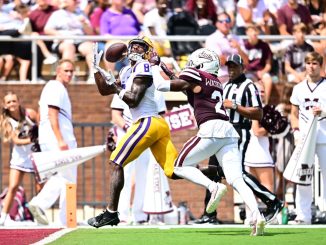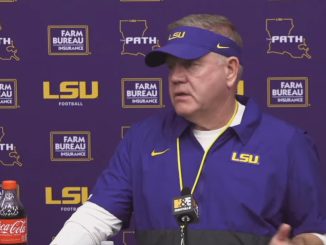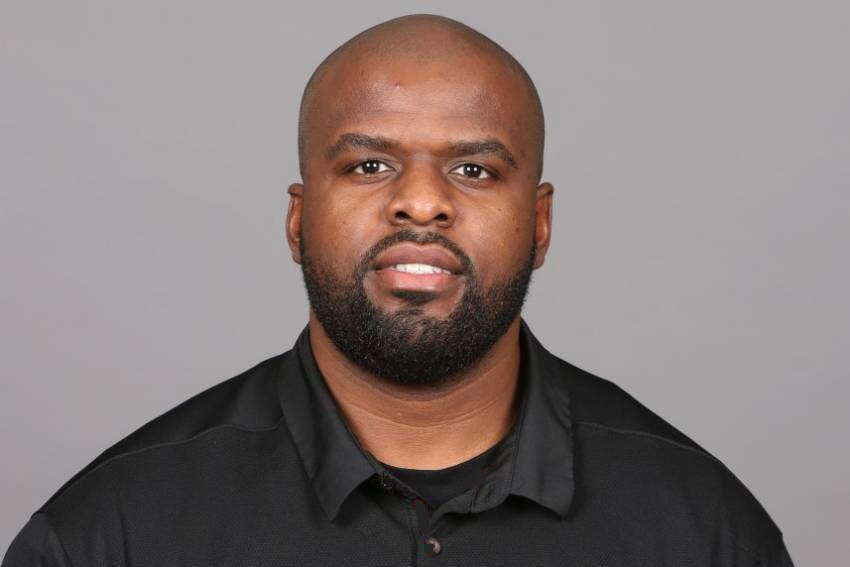
After five hours of explosive and tearful testimony from Sharon Lewis on Monday about her 20 plus years of service to LSU in what she claims was predominately a hostile work environment, along with testimony from university President William F. Tate IV largely about who fired Lewis in January 2022 and who hired Frank Wilson on December 7, 2021 – all of LSU’s fingers are pointing at Brian Kelly on both counts.
Lewis’ attorneys rested their case on Monday, after five days of trial
Kelly, the second-year LSU coach, is scheduled to testify on Tuesday as a witness for the defense.
One big issue: in his sworn deposition for this trial, Kelly steadfastly refused to accept any part in Lewis’ firing, saying he had never met Lewis, did not know anything about her situation, that he had nothing at all to do with her termination, and that he had been forewarned to steer clear of Lewis and her situation at LSU at the time of his hiring.
Second big issue: Kelly, in his deposition, said he never knew anything about any sexual harassment or sexual assault allegations against Wilson when he was at LSU during his prior stint under Les Miles, and that he was told by LSU that Wilson was cleared to hire.
More than two years after filing a federal lawsuit against her former employer claiming sexual harassment, wrongful termination, retaliation and a hostile workplace environment, former LSU Associate Athletic Director, who was also the two-term Letterman’s Club President, Lewis testified in federal court Monday about the mistreatment and hostile workplace at LSU she claims to have endured while working within the university’s football program.
“It was one of the worst experiences of my life,” Lewis said as she cried uncontrollably at times. Lewis described in detail hostilities she endured from LSU coaches and staff, including former head coach Miles, then running backs and recruiting coach and current Associate Head Coach Wilson, then COO Stephanie Rempe, current Executive Deputy Sr. Associate Athletic Director Verge Ausberry and Sr. Associate AD / Sr. Woman Administrator Miriam Segar, among others.
Lewis spent 20 years and eight months in the LSU football operations office as a leader of its football recruiting before she was fired in February 2022, purportedly by Kelly – unless you ask Kelly.
LSU contends Lewis was nothing more than a casualty – one of more than 40 staff members laid off in the weeks after Kelly took over as head coach of LSU’s football team in December 2021.
Lewis and her attorneys, however, contend she was a protected employee who could not be let go because she had filed litigation and complaints against LSU, including an EEOC complaint in early 2021 months before she was terminated via email, without warning, while on leave.
Lewis alleges she was fired in a retaliation that is inextricably tied to her filing of the lawsuit that is currently on trial in Baton Rouge’s Middle District Court, as well as the sexual misconduct complaints against Miles that she reported years earlier.
Lewis was on the stand five hours detailing several instances of sexual harassment and discrimination that occurred against her and others.
Lewis has accused LSU leaders of conspiring to cover up Title IX complaints in the athletics department to protect coaches and star athletes.
Title IX is a federal law that prohibits sex-based discrimination on university campuses. LSU, like other universities receiving federal funds, is obligated to follow Title IX policies and procedures or risk losing federal funds if they are found to be out of compliance and not following proper Title IX procedures and protocols that have been comprehensively documented since 2011 by the Department of Education.
Lewis and her attorneys allege the former LSU All-SEC track star endured a hostile workplace environment since Miles first replaced Nick Saban as head football coach in 2005 and then throughout the remainder of her employment at LSU because Lewis would not back down and comply with the athletic department practice of protecting and shielding coaches and later players who harassed and assaulted women within the department.
Saban, who hired Lewis in 2001 as a leader in his recruiting operation, ran a professional and respectful organization unlike Miles, Lewis said, sharing numerous instances where Miles sexually harassed and assaulted women, discriminated against women by nature and in practice, and bullied Lewis herself in retaliation for reporting him.
Jurors listened as Lewis detailed departmental practices in her early years in the program working underneath Saban, who she described as a personal mentor and a master at discovering football talent and building an organization because he “was all about business.”
She said she noticed an immediate change when Miles became the head coach. Lewis said she noticed a change in her very first meeting with Miles and it worried her immediately. Lewis said trouble started in that very first meeting when Miles ordered Lewis, who oversaw a team of about 75 student workers at the time, to hire prettier female student employees who worked for her in the football recruiting department.
Lewis explained Miles was fixated on the look of the young workers from the beginning and that he demanded the female students in the recruiting office ditch their business suits which Saban encouraged them to wear when he was there and to start wearing skirts instead.
“I want the blondes over the brunettes to be the face of recruiting,” Lewis said Miles told her at their first meeting before then getting up a leaving the room.
“He said that,” Lewis said, “and then he got up and left. I could not believe this had just happened.”
In 2012 and 2013, Lewis reported sexual misconduct allegations that two female students who worked under her made to her about Miles.
One of the students, Lewis said, reported Miles drove her behind the football operations building and kissed her without her consent. Lewis’ account is supported by complaints currently submitted as part of trial evidence.
Lewis said Miles began bullying her after he was inexplicably informed that she had reported him to Segar and Ausberry. Lewis testified Miles responded by pressing harder on his demands to fire existing student employees and that Miles ordered her to hire more “blonde women with big boobs” because he thought there were too many “fat, Black or ugly” student workers on her recruiting staff.
“And two weeks later, he hired a blonde lady that was just walking through our hallway,” Lewis testified.
“He saw her and demanded that we hire her for the position. And we did hire her for the position. Her name was Shelley Robert, and she was a blonde.
“She was the look that he wanted. And he told me, he pulled me to a side and said to me, ‘now Sharon, that’s the face of recruiting. That’s who I wanna see working in this office,” Lewis said.
Lewis said she told her administration she was not going to comply with Miles’ order to discriminate against her student employees, or any employees on her staff.
“I told administration I wasn’t gonna do that,” Lewis said.
“So as I was not doing what he wanted me to do, he would threaten me. One day in the office, I was in there with Frank Wilson, Sherman Morris and Sam Nader. He (Miles) gave me a directive for that weekend. He said, are the ugly girls gone? Will they not be here this weekend? Did you fire them?
Lewis then shared a gruesome exchange that took place with Miles.
“No, I did not,” Lewis said she told Miles.
“And he said, ‘if a coach’ . . . and then he cleared the room – he said, ‘everybody out of here.’ And then told me, he comes right up here (pointing to her jaw and face). And he said, ‘you see this? If I were to give somebody a direction to do something and they did not do what I wanted to do, I would punch them in their mother fucking mouth.’
“And I said, ‘Well, coach,’ and he got right on me. I said, ‘then you’re gonna have to punch me in my mother fucking mouth because I’m not firing girls based off your criteria. You’re gonna have to punch me in my mother fucking mouth.’
“And I just stood there afraid that he was gonna hit me,” Lewis said sobbing uncontrollably struggling to regain her composure so she could continue to testify.
Lewis said she ran out of that meeting straight to administration and reported the incident and how Miles had physically threatened her and how scared she was.
A few days later, Lewis said, Miles came to her office and told her he knew what she did, how he had reported her. She said he just stood there and stared at her – just stared at her – for more than five minutes. Immediately thereafter Miles started verbally assaulting and she said the angry glare sessions occurred so frequently and became so overwhelming that Lewis began hiding beneath her desk whenever she heard Miles come into the building,
“I would avoid him. I just wanted to do my job,” she said.
Lewis also said that Wilson sexually harassed her in 2013 and began sabotaging her ability to work when she refused his sexual advances.
Lewis, in her testimony on Monday, said Wilson walked into her office, closed the door, and pulled out his erect penis then asked her to touch it.
Two other women testified earlier in the trial that Wilson sexually harassed them, one with a forcible kiss in the workplace, while the other woman testified Wilson questioned her about her sex life and the type of men she preferred before taking it upon himself to describe the type of men he assumed she preferred.
Attorneys for LSU, along with Woodward, Segar and Tate in their respective testimonies, have defended Wilson, saying they have not seen any evidence of sexual misconduct Wilson and they have all justified Kelly’s hiring of Wilson to his staff shortly after he arrived from Notre Dame, with Woodward saying in his deposition that the Wilson allegations lack merit and are unsubstantiated.
Lewis’ attorneys have pointed out, however, with evidence in this trial that written allegations have existed in LSU’s HR files and in files in the LSU General Counsel’s office since early 2019 containing Lewis’ complaint against Wilson. Evidence in this case has also been presented that LSU’s background check provided to Kelly and available to Woodward before he signed off on approving Kelly’s hiring of Wilson also contained information of complaints against Wilson.
Woodward, in his testimony, said he never looked at the background report, saying he assumed his attorneys (general counsel) had.
“I don’t usually look at those,” Woodward said in his testimony.
Wilson left LSU in 2016 to become the head football coach at the University of Texas-San Antonio. He later moved on to McNeese State as head football coach before accepting Kelly’s offer to return to LSU in December 2021
LSU board member Collis Temple Jr. testified last week that he and Wilson are longtime friends and he arranged a meeting at his house with Wilson and LSU President William Tate IV before he was rehired.
Lewis testified on Monday that she thinks Tate, Temple and Wilson agreed to fire her at their meeting as a condition to entice Wilson back to LSU.
Wilson has a national reputation as a great football coach and is known as one of the nation’s best recruiters.
Tate testified Monday afternoon that the meeting with Wilson at Temple’s house was only a meet-and-greet and nothing more, that there was no discussion of hiring Wilson during the glad-hand meeting. Temple never recommended to Tate that Wilson should be hired, Tate said.
Temple last week testified that he did tell Tate he thought Wilson would be a good addition to Kelly’s new staff but that he never recommended Wilson directly to Kelly or anyone else.
Tate on Monday acknowledged signing off on Wilson’s $400,000, multi-year contract, but said it was a typical duty in his role as president, that he does not ever vet recommended hires.
It was only Kelly’s decision to hire Wilson, Tate said.




Are you covering the case or are you trying to convict lsu because of the Dale Brown court controversy?
The reporting here is so blatantly obvious.
Do better!